Auzits | |
|---|---|
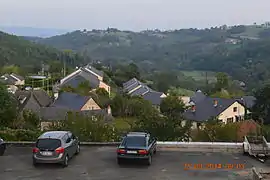 A general view of Auzits | |
.svg.png.webp) Coat of arms | |
Location of Auzits | |
 Auzits 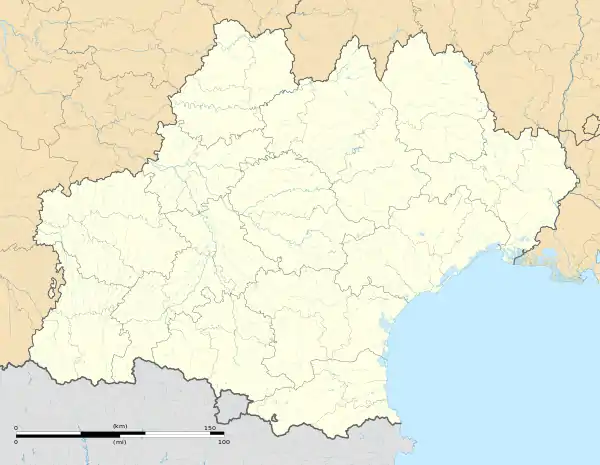 Auzits | |
| Coordinates: 44°30′28″N 2°19′42″E / 44.5078°N 2.3283°E | |
| Country | France |
| Region | Occitania |
| Department | Aveyron |
| Arrondissement | Rodez |
| Canton | Enne et Alzou |
| Intercommunality | CC Pays Rignacois |
| Government | |
| • Mayor (2020–2026) | Benoît Olivié[1] |
| Area 1 | 24.34 km2 (9.40 sq mi) |
| Population | 813 |
| • Density | 33/km2 (87/sq mi) |
| Time zone | UTC+01:00 (CET) |
| • Summer (DST) | UTC+02:00 (CEST) |
| INSEE/Postal code | 12016 /12390 |
| Elevation | 248–644 m (814–2,113 ft) (avg. 394 m or 1,293 ft) |
| 1 French Land Register data, which excludes lakes, ponds, glaciers > 1 km2 (0.386 sq mi or 247 acres) and river estuaries. | |
Auzits (French pronunciation: [ozits];[3][4] Occitan: Ausits) is a commune in the Aveyron department in the Occitanie region of southern France.
The inhabitants of the commune are known as Auzitois or Auzitoises.[5]
Geography
Auzits is located at the top of a hill with the church dominating the valley some 10 km south-east of Decazeville and 28 km north-west of Rodez. It is a large, green, and hilly commune ranging from the Plateau of Hymes to Ruhle le Haut with many vantage points especially from the highest point in the commune at Hautesserre where there is a 360 degree panorama. Access to the commune can be by many routes: the D840 from Firmi in the north passes down the eastern side of the commune and continues south-east to Saint-Christophe-Vallon; the D87 branches from the D840 in the commune and goes south-west then north to the village then west to Montbazens; the D53 from Cransac in the north passes south through the west of the commune going to Bournazel; the D189 goes south from the village towards Goutrens; the D11 comes from Cransac through the village and continues to Saint-Cristophe-Vallon; and the D631 goes north from the village to join the D840 north of the commune. A railway line passes through the commune from north to south with the Auzits-Aussibal Halt near Aussibel. Apart from the village there are the hamlets of Rulhe, Les Escabes, La Berthoumarie, Le Mas del Bosc, Aussibal, Hymes, Plateau d'Hymes, Le Coustal, and Reyrols. The commune is mixed forest and farmland.[6]
The Riou Viou flows from the south through the village then turns west along the northern border and continues to join the Riou Mort at Viviers. The Riou Mort flows north through the east of the commune and continues north-west to join the Lot at Penchot.[6]
Neighbouring communes and villages
History
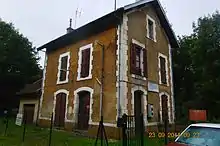
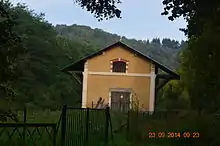
Middle Ages
In the Middle Ages Auzits was an important step for pilgrims as it lies on the road to Saint Jacques de Compostela (the path from Conques to Villefranchois). Near the present village there was a small chapel called the Chapel of the Hospital which welcomed the sick, tired, or dying. Under the responsibility of the Knights of the Order of St. John of Jerusalem, the chapel adjoining the hospice is today still in good condition.
In 1358 the English invaded the commune and stayed for thirty years. In 1398, after the withdrawal of the British, the fortified Chateau of Auzits was abandoned. Its inhabitants did not wish for another Lord so collectively decided to build the new village church on the ruins of this castle. Perched on the rocky outcrop overlooking the valley on massive buttresses, the tower was converted into a bell tower. The stones of the second tower were reused for the central nave of the church, which is the present Church of Saint-Maurice.
Contemporary era
During the 19th and 20th centuries the commune experienced spectacular development by the coal industry. The many families who lived on coal-mining declined in number due to successive mine closures in Decazeville basin, leaving only remnants that are still visible on the Rulhe road.
Administration
List of Successive Mayors[7]
| From | To | Name |
|---|---|---|
| 1792 | 1796 | Antoine Doumergue |
| 1796 | 1801 | Bernard Boyer |
| 1803 | 1812 | Jean Tournamire |
| 1812 | 1816 | Jean Christostome Garrigou |
| 1816 | 1832 | Jean François de Rudelle |
| 1832 | 1837 | Joseph Cantaloube |
| 1837 | 1843 | Jean Christostome Garrigou |
| 1843 | 1900 | Jean Pierre Bernard Agar |
| 1900 | 1908 | Jules Mouly |
| 1908 | 1920 | Jean Antoine Besses |
| 1920 | 1938 | Albert Pierre Louis Olivier |
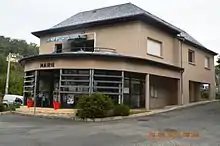
- Mayors from 1938
| From | To | Name |
|---|---|---|
| 1938 | 1944 | Emile Boyé |
| 1944 | 1945 | Benjamin Viguier |
| 1945 | 1947 | Adrien Ruffié |
| 1947 | 1959 | Joseph Delsol |
| 1959 | 1977 | Armand Lacombe |
| 1977 | 1989 | Frédéric Bourdoncle |
| 1989 | 1995 | Michel Cantala |
| 1995 | 2001 | Jean Bousquet |
| 2001 | 2008 | Michel Cantala |
| 2008 | 2020 | Jean-Louis Francès |
| 2020 | 2026 | Benoît Olivié |
Demography
In 2017 the commune had 846 inhabitants.
|
| ||||||||||||||||||||||||||||||||||||||||||||||||||||||||||||||||||||||||||||||||||||||||||||||||||||||||||||||||||
| Source: EHESS[8] and INSEE[9] | |||||||||||||||||||||||||||||||||||||||||||||||||||||||||||||||||||||||||||||||||||||||||||||||||||||||||||||||||||
Culture and heritage
Civil heritage
- Remains of a Castle. Long before the present church was built a castle dominated the valley. The castle consisted of two towers, buttresses, towering ramparts, a drawbridge, a moat, and a crypt.
- Picturesque villages in Auzits and upper Rulhe.
Religious heritage
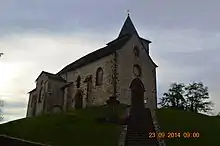
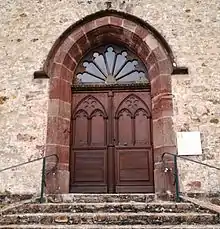
The commune has one religious building that is registered as an historical monument:
- The Church of Saint Maurice (12th century).
 [10] The church of Saint-Maurice is a curious building because of its architecture. The crypt is oriented east and is part of the old castle chapel. Long abandoned by their inhabitants, these places are now freely available for visits. Decorated with wall paintings dating from the 14th century, this crypt is one of the jewels of Middle Ages Aveyron. Inside the church the altar, made of wood, has sculptures of Saint Maurice. In the centre a painting shows Jacques de Mauleon Labastide, Knight of the Order of Saint John of Jerusalem. Many treasures are no longer present in the church as they were stolen in 2001. Notably a Virgin and Child, dating from the 16th century in polychrome wood and gilded with gold. The Church contains several items that are registered as historical objects:
[10] The church of Saint-Maurice is a curious building because of its architecture. The crypt is oriented east and is part of the old castle chapel. Long abandoned by their inhabitants, these places are now freely available for visits. Decorated with wall paintings dating from the 14th century, this crypt is one of the jewels of Middle Ages Aveyron. Inside the church the altar, made of wood, has sculptures of Saint Maurice. In the centre a painting shows Jacques de Mauleon Labastide, Knight of the Order of Saint John of Jerusalem. Many treasures are no longer present in the church as they were stolen in 2001. Notably a Virgin and Child, dating from the 16th century in polychrome wood and gilded with gold. The Church contains several items that are registered as historical objects:
- A Reliquary-Monstrance (19th century)
 [11]
[11] - A Statue: Virgin and child (15th century)
 [12]
[12] - A Ciborium (18th century)
 [13]
[13] - 2 Cruets with plate (19th century)
 [14]
[14] - A Statue: Virgin and child (15th century)
 [15]
[15] - A Retable and Painting: Saint Maurice (1610)
 [16]
[16] - A Processional Cross (17th century)
 [17]
[17] - A Reliquary-Monstrance (19th century)
 [18]
[18]
- A Reliquary-Monstrance (19th century)
- Other religious sites of interest
- Church of Saint Étienne de Rulhe.
- Chapel of Saint John of the Hospital.
- Chapel of Hautesserre.
- Cross of Hymes.
Notable people linked to the commune
- Raoul Follereau, researcher and scientist.
- Robert Girou, painter.
- Roger Noyer, resistance fighter.
- Marcial Pleinecassagne, resistance fighter killed for keeping silent in the face of the Germans in 1944.
See also
Bibliography
- Christian-Pierre Bedel, Rinhac: Anglars, Ausits, Bèl Castèl, Bornasèl, Gotrens, Las Candolièiras, Mairanh / Christian-Pierre Bedel and los estatjants del Rinhagués, Rodez, Mission départementale de la culture, coll. Al canton, 1991, ill., cov. ill., 28 cm, 230 p. (ISBN 2-907279-04-1, ISSN 1151-8375, BnF No. FRBNF36652250) (in French)
References
- ↑ "Répertoire national des élus: les maires" (in French). data.gouv.fr, Plateforme ouverte des données publiques françaises. 13 September 2022.
- ↑ "Populations légales 2021". The National Institute of Statistics and Economic Studies. 28 December 2023.
- ↑ "Antenne relais d'Orange à Auzits - YouTube". www.youtube.com. Retrieved 5 February 2021.
- ↑ Entrevista a Denise Labraga para el canal para France 3, retrieved 5 February 2021
- ↑ Inhabitants of Aveyron (in French)
- 1 2 3 Google Maps
- ↑ List of Mayors of France (in French)
- ↑ Des villages de Cassini aux communes d'aujourd'hui: Commune data sheet Auzits, EHESS (in French).
- ↑ Population en historique depuis 1968, INSEE
- ↑ Ministry of Culture, Mérimée PA00093960 Church of Saint Maurice (in French)
- ↑ Ministry of Culture, Palissy PM12000739 Reliquary-Monstrance (in French)
- ↑ Ministry of Culture, Palissy PM12000014 Statue: Virgin and child (in French)
- ↑ Ministry of Culture, Palissy PM12000717 Ciborium (in French)

- ↑ Ministry of Culture, Palissy PM12000738 2 Cruets with plate (in French)

- ↑ Ministry of Culture, Palissy PM12000013 Statue: Virgin and child (in French)

- ↑ Ministry of Culture, Palissy PM12000012 Retable and Painting: Saint Maurice (in French)

- ↑ Ministry of Culture, Palissy PM12000011 Processional Cross (in French)

- ↑ Ministry of Culture, Palissy PM12000737 Reliquary-Monstrance (in French)

External links
- Auzits official website (in French)
- Pays Rignacois
- Auzits on Géoportail, National Geographic Institute (IGN) website (in French)
- Auzits on the 1750 Cassini Map